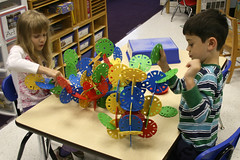We had a very interesting discussion about ethics in our PE3 class today. Our teacher showed us a couple of case studies and asked our opinion. One of the case studies referred to copying software to use in the classroom if your budget is limited. It was basically asking us if we would overlook the law in order to provide the best for our students.
This one question divided the class but not equally. Interestingly only a few people said they would not copy the software even if they felt their students were being disadvantaged.
I was one of the few.
This is not something that I need to even think about - it has come up many times in the past in my life in regard to DVD and CD and PC game copying in particular. And a much as I think sometimes the really large companies out there are making a fortune from sales, I have to think about the author or artist or owner of the information, words or music.
However, my good friend Kate did question me about other things such as pictures for this blog, or print outs from the internet for practicum, it is certainly something the think about...where do you draw the line?
 Image Source
Image Source
 It is always hard to get back into university life after having a long break, in this case our three week practicum, then you add to it being 9am on a cold Monday and well it wasn't looking good. Then our guest lecturer began to speak and the morning got a little brighter! I am not writing this post to suck up (grin) but merely to highlight the fact that if you have an interested teacher standing out front who is engaging you in conversation then you are going to learn.
It is always hard to get back into university life after having a long break, in this case our three week practicum, then you add to it being 9am on a cold Monday and well it wasn't looking good. Then our guest lecturer began to speak and the morning got a little brighter! I am not writing this post to suck up (grin) but merely to highlight the fact that if you have an interested teacher standing out front who is engaging you in conversation then you are going to learn.
In class on Monday, we looked at the concept of the digital divide - what is a digital divide? The class brainstormed and came up with the following ideas just to name a few...
- have versus have not
- understand versus no idea
- face 2 face versus digital
- innovators versus resistors
- boy versus girl
It was interesting to think about my practicum school in light of these issues but also think about my children's school. Where do they fit in this comparison and where do I fit in - am I a resistor? I hope not, I hope that my practicum experience will spur me on to learn more, not only more tools but more ways to utilise them and to enhance the learning experience of my future students.
Image source
Sometimes you go forth thinking that you will be able to use what you have been learning only to be halted by outside forces. I felt a bit this way with my practicum. My class, in fact the school, I was attending was not very tech savvy, sure they had the 'appliances' but they really did not put them to use, good or bad!
My classroom had an IWB and three computers, they even had computer monitors (as in students that were part of the class jobs roster) to start up the computers every day, however I never saw them used, the computers that is and my cooperating teacher only used the IWB once the whole time I was there.
After being so fired up about Web 2.0 and all the tools available to us as pre-service teachers, it was disappointing to see the tools of this school going to waste.
 Image Source
Image Source
Well I have started prac, I have a lovely cooperating teacher and a class full of lively 7 year olds. Day 1 - Observation and the kids had their computer class which I was excited to see but sadly very disappointed with how the class was run and what the kids actually got to do - not much. I am starting to see that we as future teachers are going to have to push hard to make ICT a better learning experience for our students. Something more than log on, click here, finish up and sit on the mat!
The upside is there is a IWB in the classroom - the downside is I have not seen it used yet. I really hope that next week I get to see some ICT used effectively in the classroom and maybe work with the kids on something fun and interactive.
 Image Source
Image Source
I have many wonderful colleagues out in cyberspace right now blogging to their hearts content and one of the benefits of this is that we are all sharing our new finds, our ideas and suggestions. One such colleague is Janna, in a recent blog post she writes about not knowing how to put a little 2 in her equation, you know, as in metres squared. Well it is funny because I had the same issue with the division symbol - you know the one with - and two dots. Gotta love Google and sharing and collaboration. This is how I am making it though the maze of technology and for that matter university as a whole. I am guessing that collaboration and sharing and if I am honest, Google, will all be a part of my life as a teacher. It is through this cooperation that I will benefit most.
The word cooperation is a funny one for me as it always reminds me of Sesame Street - they were big on cooperation when I was watching as a kid in the 70s. It is a wonderful thing and it has stuck with me all these years. I digress slightly but it is all about learning and retaining and little kids can retain an awful lot if we go about imparting knowledge in a meaningful way.
 Image Source
Image Source
My colleague, Lydia, talks further about Constructionism in a recent blog post. The article she refers to takes the idea of constructionist learning and applies it to something that most kids love - gaming - on the computer, game consoles, iPods - you name it and kids will be using it to play games. I witness this all the time with my own children and my friends children. And as a parent, I often wonder, are they learning anything? Is this ok? Can this much computer time be good for my child? It is a problem that many parents face but looking at this from a different perspective I can see the possible benefits. In some of the games, children can design what happens, where it happens and how it happens. Surely these experiences are of benefit.
By allowing our children and students to make the games they want to play, we allow them to learn the ins and outs of games but also the process and logical thought that goes hand in hand with making a successful game. Students will have to offer feedback for others games and in turn make improvements. All skills that will be valuable for life not just school.
 Image Source
Image Source
Constructionism: Children learn best when they use computers in a way that puts them in the active roles of designer and builder.
So what does this mean? How can I as a future teacher use this in the classroom? Is it just the process that makes the learning happen or the sharing of the learning?
In this article, Idit Harel, shares with us the theory of constructionist learning developed by Seymour Papert in the 1980s. Here Harel uses the example of when we as adults need to impart our knowledge to someone else, by teaching we learn the subject very well. My friends and I have discussed this before as one of the ways we learn. It is the same for children. If they work hard and learn and then share that knowledge with others it will stay with them for a very long time, maybe even for life.
As teachers if we encourage students in creating their own cyber space (whatever form that may take) and have them decide what they put in their space and then share it with a community, we can not only expand their knowledge but cement it firmly in place.
 Image source
Image source






